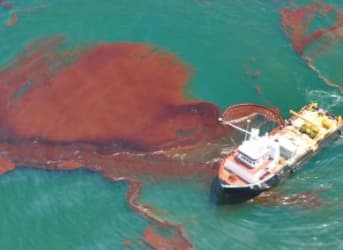Four years later, it is clear BP gravely miscalculated the magnitude of their mistake. On Monday, the United States Supreme Court rejected BP’s settlement appeal regarding 2010’s Deepwater Horizon disaster in the Gulf of Mexico. The ruling – the latest of several against the company – means the oil and gas major will have to continue its payments to affected businesses and individuals. Shares of the company fell nearly three percent following the verdict, putting an exclamation mark on what has been a tough final quarter for the British multinational. BP, whose legal odyssey is far from over, now faces an even tougher 2015 as the company looks to leverage its future to overcome its past.
BP maintains federal courts and the claims administrator have misinterpreted its 2012 settlement, allowing unaffected parties to collect millions in unwarranted damages – an argument the highest court decided not to hear. The settlement, originally valued at $7.8 billion, could soon break the $10 billion mark.
Fines and associated expenses have thus far cost BP more than $28 billion. What’s more, Clean Water Act penalties to be assessed in January may levy an additional $18 billion hit before it’s all said and done. As if the legal obstacles weren’t enough, low oil prices and sanctions have created a perfect storm.
Related: Big Oil Going Big In The Gulf Of Mexico
BP Share Price (USD) – June to December

Source: BP
Since June, BP’s share value is down approximately 28 percent – a fall that largely mirrors oil’s. The collapse wiped away a furious rally to start the year and brings the company to its lowest point in over two years. Aggressive divestment – a plan to create more liquidity following the spill in 2010 – will continue, but it has stripped the company of productive fields and heavily impacted the bottom line. Third-quarter production fell 2.7 percent to 2.15 million barrels of oil equivalent per day and is expected to fall further by the end of the year.
BP, now a third of its 2010 size, is moving forward with plans to trim its workforce. Non-operations staff and back-office employees face layoffs as the company tries to bring its organization in line with its smaller portfolio. Per its restructuring plan, BP will shave another $10 billion in assets toward 2016 – about $50 billion has been shed to date.
Related: Ten Reasons Why A Sustained Drop In Oil Prices Could Be Catastrophic
Details of the plan are unclear, but BP will struggle to reduce its presence in Russia. The high-risk, high-reward environment has proved mostly a headache for the company over much of the last decade. CEO Bob Dudley is on the record as defending BP’s long-term position in the country, but a crumbling geopolitical situation will test his reserve.
Currently, BP holds a nearly 20 percent stake in Russia’s state-owned Rosneft. Its Russian assets – very productive to date – account for up to a quarter of its global production and roughly one-tenth of its operating income. However, Western sanctions and a collapsing ruble are beginning to take their toll. Third-quarter pretax income from Rosneft is down over 86 percent to $107 million. Dividends from the state giant are sure to stay down in the medium-term as Russia’s central bank anticipates the sanctions will run into 2017. Rosneft is in no position to buy back the shares and outside buyers will be limited.
What BP does have in its favor is the right to a not-so-speedy appeals process in US courts, mitigating the financial burden in the present. Still, much is riding on only a small handful of new and costly projects. While not yet priced out, margins will be razor thin in the oil sands of Canada and the Gulf of Mexico, where BP looks to make gains in 2015. BP won’t cut its dividends, which have risen steadily since the spill, but darker days may soon lie ahead.
By Colin Chilcoat of Oilprice.com
More Top Reads From Oilprice.com:
- The 2014 Oil Price Crash Explained
- Gulf Of Mexico Deepwater Reserves May Have Been Overestimated
- Subsea Production: The Next Big Trend In Offshore Drilling


















